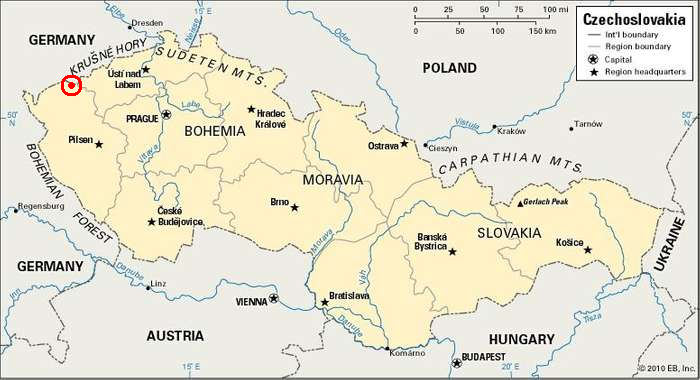Apparently, yes.
This site states (translation mine):
Während des Zweiten Weltkriegs, St. Joachimsthal war damals Teil des ans Deutsche Reich angeschlossenen Sudetenlands, wurde in den Gruben Uran für Forschungszwecke der deutschen Wehrmacht abgebaut.
"During World War II, St. Joachimsthal being part of the Sudetenland incorporated into the German Reich back then, Uranium was mined for research purposes for the German Wehrmacht."
The website was produced by the German-Czech Textbook Commission.
This site states (translation mine):
Im Zuge der Umsetzung des 1941 erarbeiteten "Göring-Programms" wurden zuerst französische, später sowjetische Kriegsgefangene in den Minen von Sankt Joachimsthal eingesetzt.
"In the course of implementing the 'Göring program' compiled in 1941, first French, later Soviet POW's were employed in the Sankt Joachimsthal mines."
The website was produced by the University of Oldenburg.
As an update to a question in the comments as to how much Uranium was mined, via the German WP article on the Uranprojekt I found this Spiegel article, translation mine (as much as I loathe citing David Irving for anything):
Auer beutete seit der Einverleibung der Tschechoslowakei im März 1939 die Uranbergwerke in Sankt-Joachimsthal aus, und der Laborleiter Nikolaus Riehl erachtete das Uranprojekt als so vielversprechend, daß er selbst die Leitung der Uran-Produktion übernahm und innerhalb weniger Wochen in Oranienburg einen Betrieb aufbaute, dessen monatliche Produktionskapazität etwa eine Tonne Uranoxyd betrug.
"Since the annexiation of Czechoslovakia in March 1939, Auer [company] exploited the Uranium mines in Sankt-Joachimsthal, and the laboratory supervisor Nikolaus Riehl deemed the Uranprojekt so promising that he himself took control of the Uranium production. Within a few months he did built a factory in Oranienburg capable of producting about one [metric] ton of Uranium oxide per month."
Note that the connection between the Oranienburg factory and the Joachimsthal mines is a rather loose one; the same article also mentions that Germany took hold of 3500 tons of Uranium minerals from the Union Minere in Belgium, and that the Auer company used (mainly?) those to satisfy their demands.
